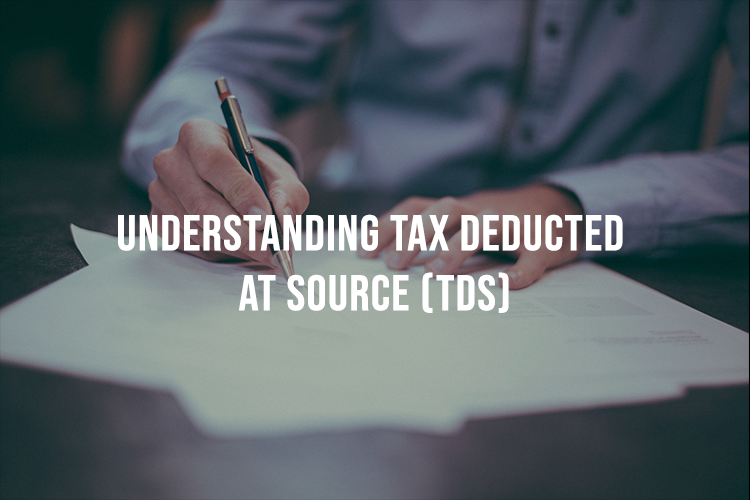The TDS process is an integral part of TDS in accounting and is applicable to services and not goods. This tax is deducted from specific payments such as professional payments, contract services, interest payments, rent, commission, salary, etc. TDS deductibles differ based on the service provider, i.e., professional services – 10%, contract services – 2%, interest payment – 5%, and individual – 1%.
The TDS in the accounting process facilitates the deduction of advance tax by the payer from the payment amount itself and its submission to the government. This ensures that the recipient of the payment does not need to pay income tax for the payment amount. Generally, the person receiving the payment is responsible for paying income tax. However, with the TDS process in accounting, the person/entity making the payment for the services deducts the amount at the source. This ensures that individuals and entities fulfill their tax obligations and makes it a convenient way to collect tax revenue for the government.
It is important to note that the TDS process in accounting is a legal requirement, and failure to comply with it may result in penalties for the payer. In conclusion, the TDS in the accounting process is a crucial aspect of income tax and ensures that tax is collected efficiently from different sources of income.
What is the due date for depositing TDS with the government?
The TDS process in accounting mandates taxpayers to pay their TDS to the government by the 7th of the following month. For instance, the TDS process in accounting stipulates that TDS deducted in June must be deposited with the government by the 7th of July. Similarly, for TDS deducted in March, the TDS process in accounting allows the payment to be made up until the 30th of April. It is important to note that the TDS process in accounting also requires TDS cut on rent paid or property purchased to be paid within 30 days from the end of the month in which the TDS was deducted. By adhering to the TDS process in accounting, taxpayers can ensure timely and accurate payment of their TDS obligations, as well as compliance with relevant tax laws and regulations.
To facilitate the TDS in accounting process, taxpayers must have a PAN (Permanent Account Number) which is linked to their income and used for all income tax filings. In addition, a company must have its own PAN card, while sole proprietorships use the individual’s PAN number for filings.Furthermore, as part of the TDS process, each company must have a TAN (Tax Deduction/Collection Account Number) to cut TDS on their vendors and file the amount. Without a TAN number, a company cannot participate in the TDS process, which is mandatory for private limited companies and other applicable companies for audits. Adhering to the TDS process ensures that taxpayers fulfill their tax obligations and facilitates efficient collection of tax revenue for the government.

Streamline all Back End Operations so that you can save Time & Money and focus on GROWING YOUR BUSINESS.
Accounting & Tax: Let us crunch the numbers, so you can focus on growing your business.
Virtual CFO: Experience financial success with a Virtual CFO by your side.
Internal Audit: Gain peace of mind with our comprehensive internal audit services.
Company Secretary: Let our experienced Company Secretary guide you through corporate compliance effortlessly.
How does TDS work?
To understand how the TDS deduction process works in accounting, let’s take the following example. Sky Pvt. Ltd. paid its office rent of Rs. 60,000 per month to the building owner, and TDS was to be deducted at 10% as per the TDS deduction process in accounting regulations. As per the TDS deduction process in accounting, Sky Private Limited must deduct TDS of Rs. 6000 from this payment of rent, and pay only Rs. 54,000 to the building owner.
Consequently, in this case, the receiver of the amount, i.e., the building owner, will receive the net amount of Rs. 54,000 after the deduction of TDS in the TDS deduction process in accounting. The building owner will then display a gross amount of Rs. 60,000 in his income as per the TDS deduction process in accounting, and can take credit for the TDS deducted, i.e., Rs. 6000, by Sky Private Limited against his final tax liability, as per the TDS deduction process in accounting regulations.While calculating Advance tax for a company as per the TDS deduction process in accounting rules, we also have to consider TDS (only where applicable for services). The Advance tax is paid after reducing the total TDS to be paid by the recipient of the payment, as per the TDS deduction process in accounting procedures. Therefore, it is essential to understand the TDS deduction process in accounting thoroughly to ensure compliance with the regulations and avoid penalties.
Let’s assume your business has to pay Rs. 50,000 to an outsourcing firm for professional services. If you have a tax deduction number (TAN), as a deductor, you will deduct a tax of Rs. 5,000 and make a net payment of Rs. 45,000/- (Rs. 50,000/- deducted Rs. 5,000 tax). The amount that you deducted from the outsourcing firm should be deposited to the government.For instance, a company XYZ Pvt. Ltd. has to pay Rs.50,ooo to Mr ABC in exchange for professional services. XYZ Pvt. Ltd. deducted Rs 5000 as TDS from the payment amount to be paid to Mr ABC and paid to the government. If Mr ABC’s payable tax is Rs. 75,000, he will deduct Rs. 5,000 and pay the balance, since XYZ Pvt. Ltd. has already deposited Rs. 5,000 in his name.
Here, two scenarios may arise:
1- You pay the entire amount to the outsourcing firm without any tax deduction.
2- You deduct TDS but file an incorrect amount with the Government.
In either of the above cases, as per the regulations, you cannot show this payment as an expenditure. It will ultimately increase the company’s profit margin, and therefore you’ll be paying a higher amount in tax. Worse than this, you’ll be bearing a penalty of Rs. 200 a day, under section 234E for the delay in filing TDS.
26AS Reconciliation:
Understanding how TDS is linked to your Permanent Account Number is critical. TDS deductions are connected to both the deductor and the deductee’s PAN numbers. If TDS has been reduced from any of your income sources, you must fill out Tax Credit Form 26AS. All PAN holders have access to this form, which is a consolidated tax statement.
Once the TDS due date has expired, the service provider, i.e. Mr. ABC will reconcile with his client, i.e. XYZ Pvt. Ltd., to ensure that the correct amount has been filed and paid. This same process has to be executed every quarter post the TDS return filing due date.
Other significant points related to TDS.
- Delays in TDS payments will result in you/your business having to pay an 18% fine on the amount defaulted upon per year.
- There are different threshold limitations for various types of services. For instance- professional service-related payments of less than Rs. 30,000 are exempt from TDS
- TDS is cut on the invoice amount and not on the total amount with GST i.e. if the invoices are of Rs. 100 + 18%GST – 10% TDS, the amount of TDS is Rs. 10 (i.e. 10% of 100) not 10% of Rs. 118 (including GST).
When is it applicable and by whom should it be deducted?
Any person or entity making payments as specified under the Income Tax Act is obligated to deduct TDS at the time of making these specified payments. However, no TDS can be deducted if the person making the payment is an individual or HUF (Hindu Undivided Family) whose records are not required to be audited.
Individuals and HUFs are obligated to deduct TDS at a rate of 5% on rent payments exceeding Rs 50,000 per month, even if the individual or HUF is not subject to a tax audit. Individuals and HUFs who are required to deduct TDS at 5% do not need to apply for TAN. Employers deduct TDS on their employees’ salaries at the applicable income tax slab rates. Banks deduct TDS at a rate of 10%.
What is the process?
Filing TDS returns is compulsory for all individuals who have deducted TDS. TDS returns must be paid quarterly to the government, and different information such as TAN, amount of TDS deducted, payment type, deductee’s PAN, etc. must be provided. In addition, several forms are recommended for submitting returns depending on the purpose of the TDS deduction. Form 26QTDS is required for all payments other than salary.
Creating the right trackers to help with the process
It is imperative for all businesses to have a steady and streamlined financial process by which they can pay their employees and clients on time after a valid deduction. If you fail to manage all this, especially TDS, you might end up paying huge penalties for mismanagement of records. In this sense, QuikChex can help you manage everything smoothly and eliminate legal fines. On every payroll cycle, QuikChex will prepare a breakdown of the total TDS to be paid to the government based on the overall earnings and exemptions. It is fully automated and even creates TDS certificates so employees don’t need to spend time understanding the nitty-gritty of downloading TDS certificates from TRACES websites.
At Brego Business, we know that accurate payroll and compliances like TDS are critical tasks. If you are looking for a better and more cost-effective way to manage your financial records and compliances, we are the best accounting firm. We will take care of your entire payroll process while you focus on your core business strengths. Get in touch with us through our website or drop in a message here!
Understanding TDS & the TDS Returns Process – Brego Business
TDS (Tax Deducted at Source) is a crucial aspect of accounting for businesses in India. The tax collection system is implemented by the Indian government, where the deductor collects tax at the time of income payment and deposits it with the government. The TDS filing process, which includes calculating the tax amount, depositing it with the government, and filing TDS returns, can be quite complex and time-consuming. This complexity is especially true for businesses offering digital marketing services, as TDS on digital marketing has become an important area of concern.
At Brego Business Accounting Services, we have a team of experts with in-depth knowledge of TDS laws and regulations to assist businesses in navigating the TDS filing process. Our services include TDS calculation, depositing with the government, and filing TDS returns online. We understand the significance of TDS compliance in accounting for businesses and strive to ensure that our clients stay compliant with TDS laws.
With our TDS filing and TDS return filing services, businesses can focus on their core activities and leave the TDS compliance to us. We aim to help businesses stay compliant with TDS in accounting laws and avoid penalties and fines. So, if you have any TDS-related queries, feel free to reach out to Brego Business Accounting Services.
Accounting outsourcing services – because we love spreadsheets more than you do. Find out more about us below




